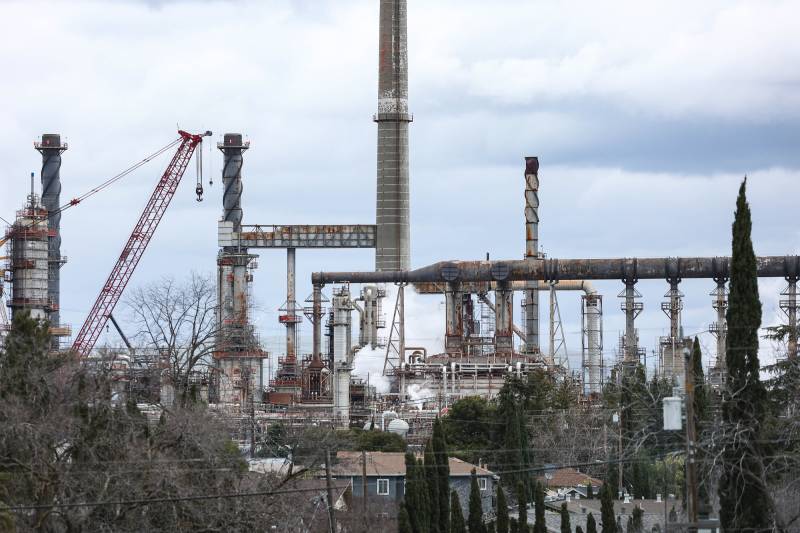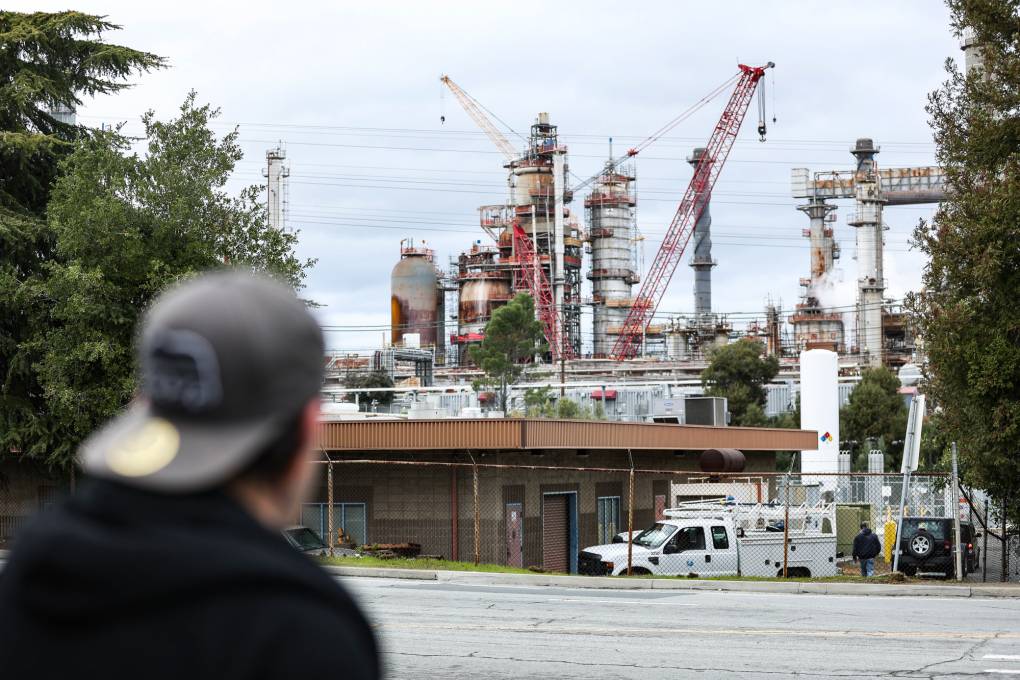On July 11, 2023, and Oct. 6, 2023, the refinery unintentionally released petroleum coke dust — a refining byproduct that looks like soot and is made up of particulate matter that can irritate lungs.
“Clearly, the refinery does not care about any of the penalties associated with their violations if these types of situations keep happening,” said Elizabeth Butler, who has lived in Martinez for more than a decade.
“What if there was an explosion? Martinez would be gone,” Butler continued.
“How is anyone in this room supposed to have any amount of hope moving forward?” said Justin Gomez, an activist with local watchdog group Healthy Martinez. “The policies as they exist now, whether it’s the industrial safety ordinance, whether it’s the state investigations — it doesn’t seem like there’s any lever that can be pulled that will disincentivize this insanity that’s happening over and over again.”
The Martinez Refining Co. took over operations in 2020 after New Jersey-based parent company PBF Energy purchased the facility from Shell. The Bay Area Air District has issued 173 notice of violation tickets to the refinery since MRC began operations and is working with the Contra Costa County District Attorney’s Office on an enforcement case for “nearly all” of the outstanding violations.
Refinery manager Dan Ingram told town hall attendees that the company prioritizes worker and community safety and that it has invested hundreds of millions of dollars in environmental and safety compliance and other regulatory requirements.
“We have lots of policies, procedures, things to prevent accidents like this from occurring,” Ingram said. “We need to finish the root-cause investigation so we can understand exactly what took place here, so we can work to prevent it in the future.”
He added, “That is our commitment to this community: to work night and day until we understand it and we can work to prevent it.”
Ingram said only the refinery units undamaged by the fire will resume fuel production next month. Damaged units will require an estimated $30 million to repair but should be running again in September.
Community advocates say the reopening of the refinery should be contingent upon the completion of all the investigations into the root cause of the fire, whether any safety regulations were violated and whether toxicology reports point to any long-term health effects.
The company said its root-cause investigation should be completed by the end of March.
Nicole Heath, the county’s director of Hazardous Materials Programs, said the agency hopes to hire a company to complete an independent investigation into the cause of the fire by the end of April.
Contra Costa Health will retain oversight of the refinery and ensure that the company conducts a pre-startup safety review for each production unit they plan to restart.
In a letter to refinery officials earlier this week, Heath said oversight will continue “until safe startup of the refinery.”
Heath said her agency is giving added scrutiny to the refinery’s recovery due to the severity of the Feb. 1 incident and past safety incidents at the facility.
“The fire was classified as a major chemical accident or release, posing a serious threat to workers, residents and the environment,” Heath added. “Given the refinery’s history of safety incidents, Contra Costa Health is taking proactive steps to ensure compliance with all state and local regulations.”
The Bay Area Air District has issued three notices of violation to PBF Energy in connection with the fire, citing it as a public nuisance and for excessive smoke and soot fallout.
“ This was a serious event, but it was not captured by nearby air pollution monitors because of the favorable meteorological conditions,” air district senior spokesperson Viet Tran said at the town hall.
Tran emphasized that the number of notices does not indicate the level of fines likely to be issued.
“ We consider the extent, duration, harm and other factors in assessing penalties,” he said. “We are continuing to investigate, and additional violations are possible.”
The air board will have final results from air samples by the end of March.
Cal/OSHA declined to comment on its ongoing investigation into the Feb. 1 fire. The agency has up to six months to issue citations.
“We’ve had numerous town halls, numerous meetings, both big public meetings and small meetings, asking for change and improvement,” Martinez Mayor Brianne Zorn told KQED after the town hall, noting that moving the needle will require county regulators to exercise their full oversight powers.
“The industrial safety ordinance gives them quite a few powers to do quite a few things after incidents and major chemical releases that they may not have taken advantage of after the spent catalyst release or the coke dust incidents,” Zorn said.
Shanelle Scales-Preston, a Contra Costa Board of Supervisors member whose district includes Martinez, convened last week’s town hall. She told residents she’s identified one power the county hasn’t used in relation to the Martinez refinery: a full facility audit that would allow the county to assess the safety and compliance of every unit in the facility, as well as safety procedures and training.
“ We’re going to make sure we’re on-site and make sure they’re doing everything they need to do,” Scales said. “ We want to make sure you’re safe.”


